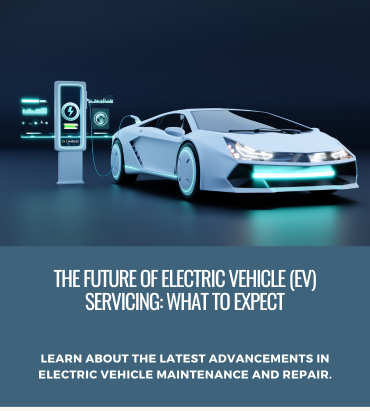Introduction:
The automotive industry is undergoing a significant transformation with the rise of electric vehicles (EV’s). As more car manufacturers invest in EV technology, an increasing number of consumers are considering electric cars for their environmental and economic benefits. With this shift, it’s essential to explore what the future holds for servicing and maintaining electric vehicles. In this article, we’ll delve into the growing trend of EV’s and discuss what car owners can expect in terms of servicing and maintenance for these innovative vehicles.
1. Fewer Moving Parts:
One of the primary advantages of EV’s is their simplicity and reduced number of moving parts compared to traditional internal combustion engine (ICE) vehicles. Electric motors have far fewer components, resulting in less wear and tear. This means that EV’s generally require less frequent servicing and have lower maintenance costs. Owners can expect fewer visits to the mechanic for tasks like oil changes and transmission repairs.
2. Specialized EV Service Centres:
As EV adoption continues to grow, specialized service centres dedicated to electric vehicles are becoming more prevalent. These centres have technicians trained in EV-specific maintenance and repair procedures. Car owners can expect expert service tailored to their electric vehicles’ unique needs, which can lead to quicker and more efficient servicing.
3. Battery Maintenance and Replacement:
EVs are powered by lithium-ion batteries, which are a crucial component of the vehicle. Over time, battery capacity can degrade, impacting the car’s range. However, car owners can expect more accessible and affordable battery maintenance and replacement options as technology advances. Some manufacturers are already offering battery recycling and refurbishment programs.
4. Software Updates and Diagnostics:
EV’s are equipped with advanced software systems to manage various functions, from battery management to regenerative braking. Car owners can expect regular software updates to enhance performance, improve efficiency, and address any bugs or security vulnerabilities. Diagnostic tools that can identify and resolve software-related issues will become more integral in servicing EVs.
5. Charging Infrastructure and Services:
The growth of EV’s has led to the expansion of charging infrastructure. Car owners can expect more accessible and convenient charging options, including fast-charging stations and home charging solutions. EV servicing centres may also offer charging-related services, such as charger maintenance and repairs.
6. EV-Specific Tools and Equipment:
Servicing and maintaining EV’s require specialized tools and equipment. Car owners can expect that service centres will invest in these resources to provide the best care for electric vehicles. Technicians will be trained to handle high-voltage systems safely and efficiently.
Innovations and Challenges:
While the future of EV servicing is promising, there are challenges to overcome, including the need for standardized maintenance procedures, addressing high-voltage safety concerns, and ensuring that service centers have the necessary expertise and equipment. Car manufacturers, service providers, and regulatory bodies are working to address these challenges and create a robust ecosystem for EV servicing.
Conclusion:
The future of electric vehicle servicing is evolving to accommodate the growing trend of EV adoption. Car owners can expect streamlined maintenance, specialized service centres, and advancements in battery maintenance and software updates. As the EV market continues to mature, servicing and maintaining electric vehicles will become more convenient, cost-effective, and efficient, making the transition to electric cars even more appealing for consumers. Staying informed and taking advantage of the evolving EV servicing landscape will help ensure the longevity and optimal performance of your electric vehicle.


